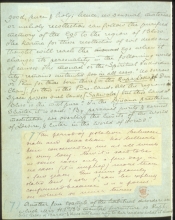Page 14
good, pure and holy; hence, no sensual, material or unholy recollection can follow the purified memory of the Ego to the region of Bliss. The Karma for these recollections of evil deeds and thought will reach the Ego when it changes its personality in the following world of causes. The Monad, or the "Spiritual Individuality," remains untainted in all cases. "No sorrow or Pain for those born there (in the Rupa-Loka of Deva-Chan); for this is the Pure-land. All the regions in Space possess such lands (Sakwala), but this land of Bliss is the most pure." In the Djnana Prasthana Shaster, it is said: "by personal purity and earnest meditation, we overleap the limits of the World of Desire, and enter in the World of Forms."
(7) The period of gestation between Death and Deva-Chan has hitherto been conceived by me at all events as very long. Now it is said to be in some cases only a few days, in no cases (it is implied) more than a few years. This seems plainly stated, but I ask if it can be explicitly confirmed because it is a point on which so much turns.
(7) Another fine example of the habitual disorder in which Mrs. H.P.B.'s mental furniture is kept. She talks of "Bardo" and does not even say to her readers what it means!



Djnana Prasthana Shaster probably refers to the Jñāna-prasthāna-śāstra, composed by Katyayaniputra. The Jnanaprasthana ("establishment of knowledge") is one of the seven Sarvāstivāda Abhidharma Buddhist scriptures.